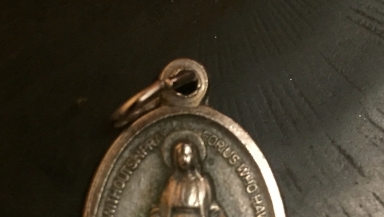There are saints, and then there are sinners. After my meeting with Mother Teresa, it became clear which category she was in, and the one that I belonged in.
At the time I met Mother Teresa, I was the Religion Correspondent for The Times, where I worked for 27 years. I had been sent to cover her address in Birmingham at the Catholic Church's National Conference of Priests of England and Wales.
Like all journalists, much of my work was to do with writing about the flaws, mistakes and errors of others.
This was nothing personal, but to do with the nature of news and how newspapers work. In religion reporting, "bad news" can be seen as "good news" by editors because religious people aim so high.
Thus when they fall, they fall is harder and in secular news terms, this makes for a "better" story.
I came to dislike intensely that aspect of my job.
Anyway, as I was walking through the windswept concrete underpasses of Birmimgham, a city I knew well from my time on The Birmingham Post, what felt like a piece of grit was blown into my eye.
I thought nothing of it and continued on to the conference, where Mother Teresa was a guest of honour.

The visit was low-key. She spoke, humbly and simply, of how to live a godly life. In effect, she was describing how to live by the Christian virtues that a person who is canonised must exemplify. She was clearly modelling her life on the lives of saints who had gone before her.
Christian martyrdom is the ultimate witness of heroic virtue, as Augustine of Hippo originally said.
But for the many saints who are not martyrs, it is also possible to achieve a life of heroic virtue. This is done by living out the well-known virtues of faith, hope and charity, or love, as well as the cardinal virtues of prudence, justice, temperance and courage.
Afterwards, I was honoured to be introduced. She gave me one of her "miraculous medals" that she used to hand out by the hundreds. Sometimes she would dole them out from a basket, but on this occasion she had a whole lot in some very deep pockets in her religious robes.
Even for those such as myself, there is hope. And with her little medal, Mother Teresa handed out hope in a way that left me in no doubt I had just had the privilege of meeting a living saint. She worked a miracle of sorts for me, but it took a long time coming and it was not a miracle I expected.
In fact, a few days after meeting her, I went blind.
Being still so ridden with defects of character at the time, I could not see how this was in any way a good thing.
My life as an adult has been a never-ending struggle for self-improvement in the face of some serious and deep-rooted character flaws.
By the time I met Mother Teresa in 1992, I was seven years into a life of "recovery" built around service to others that has continued to this day.
Fundamental to this life is becoming willing for God to remove, if possible, my defects of character. But becoming willing, praying and even begging for them to be removed is no guarantee that they will be. Thought and prayer is not enough. Action and hard work is required.
I went blind because the piece of "grit" that had blown into my eye was not grit at all, but a rather enormous "beam" of glass. The eye became seriously infected. This blinded me because my other eye had previously stopped working properly.
There I was, writing daily about the motes in the eyes of others, and now not even seeing through a glass darkly because of the hideous beam in my own.
Besides the pain and the darkness, there were also bizarre and frightening visions of flashing light that, despite my natural religiosity, were clearly physical and not spiritual in origin.
I could not see at all. The chilling biblical parables enunciating my own sin were clear, but it took more years again properly to understand, properly to see.
Moorfields Hospital saved the day. A surgeon there found and extracted the glass. I've worn glasses or lenses to correct short-sightedness ever since. But the inner work, on those defects, goes on. I don't look at my little Mother Teresa medal and pray: "Intercede with God to remove my shortsightedness." I look at it and pray the prayer of St Francis, ask God to remove those defects of character, pray to be shown how to be a better wife and mum, a better journalist, a better Christian. I pray for others. And I thank God for His original gift that made it all possible.













